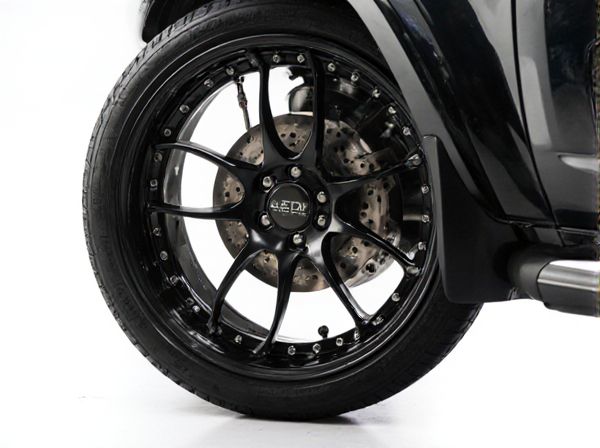
Photo illustration: Forged Wheels vs Cast Wheels
Forged wheels offer superior strength and durability due to their manufacturing process, which compresses metal under high pressure, making them lighter and more resistant to damage compared to cast wheels. Cast wheels are produced by pouring molten metal into molds, resulting in a more affordable option but with a higher susceptibility to cracks and bending under stress. Choosing forged wheels enhances your vehicle's performance and longevity, especially in demanding driving conditions.
Table of Comparison
| Feature | Forged Wheels | Cast Wheels |
|---|---|---|
| Manufacturing Process | Forged from solid aluminum using high pressure | Poured molten aluminum into molds |
| Strength | Higher structural strength and durability | Lower strength, prone to cracks |
| Weight | Lighter, improves performance and fuel efficiency | Heavier due to casting process |
| Cost | More expensive due to complex process | More affordable and widely available |
| Customization | High customization options for design and fit | Limited customization |
| Usage | Ideal for performance cars and racing | Suitable for daily driving and budget vehicles |
Introduction to Forged vs Cast Wheels
Forged wheels are created by compressing a solid billet of aluminum under extreme pressure, resulting in a denser, stronger material with superior performance characteristics compared to cast wheels, which are formed by pouring molten aluminum into molds. The forging process enhances the metal's grain structure, increasing durability and reducing weight, making forged wheels ideal for high-performance and racing applications. In contrast, cast wheels offer a cost-effective solution with greater design flexibility but generally weigh more and have reduced strength.
Manufacturing Processes Explained
Forged wheels are manufactured through a process that involves applying extreme pressure to a solid billet of aluminum, resulting in a dense, strong, and lightweight structure ideal for high-performance applications. Cast wheels, by contrast, are created by pouring molten aluminum into molds, allowing for more complex shapes but often resulting in a higher porosity and lower density compared to forged wheels. The forging process enhances grain structure alignment and mechanical properties, whereas casting offers cost-effective production with potentially more design flexibility but generally at the expense of strength and weight efficiency.
Key Differences in Material Strength
Forged wheels are made from a single piece of high-grade aluminum alloy that undergoes extreme pressure and heat, resulting in enhanced material density and superior strength compared to cast wheels. Cast wheels are produced by pouring molten aluminum into molds, which can create microscopic porosities and potential weaknesses, making them generally less durable under stress. The superior tensile strength and fatigue resistance of forged wheels make them ideal for high-performance applications where durability and weight savings are critical.
Weight Comparison: Forged vs Cast
Forged wheels are significantly lighter than cast wheels due to their manufacturing process, which compresses aluminum billet under high pressure, enhancing strength and reducing material mass. The reduced weight of forged wheels improves vehicle performance by lowering unsprung mass, leading to better acceleration, handling, and fuel efficiency. In contrast, cast wheels involve melting and pouring aluminum into molds, typically resulting in heavier components that sacrifice weight savings for lower production costs.
Performance Impact on Vehicles
Forged wheels offer superior strength-to-weight ratios compared to cast wheels, significantly enhancing vehicle acceleration, braking, and handling due to reduced unsprung mass. The enhanced structural integrity of forged wheels improves resistance to impact and deformation under high-stress driving conditions, providing better durability and reliability in performance applications. Cast wheels, being heavier and less rigid, may compromise responsiveness and fuel efficiency, limiting overall driving dynamics and performance on both road and track environments.
Durability and Longevity
Forged wheels offer superior durability and longevity due to their manufacturing process, which involves compressing high-grade aluminum under extreme pressure, resulting in a denser and stronger material. Cast wheels, produced by pouring molten aluminum into molds, tend to be more prone to cracks and deformation under stress because of their lower material density and inherent porosity. The enhanced structural integrity of forged wheels makes them ideal for high-performance applications where resistance to impacts and long-term wear is critical.
Cost and Value Considerations
Forged wheels typically cost significantly more than cast wheels due to their complex manufacturing process and superior strength-to-weight ratio, offering enhanced performance and durability. Cast wheels provide a more affordable option with adequate strength for everyday driving, but they may lack the longevity and resilience found in forged alternatives. Choosing between forged and cast wheels ultimately depends on balancing budget constraints with desired performance and long-term value.
Customization and Design Options
Forged wheels offer superior customization and design options due to their manufacturing process, allowing precise engineering of unique shapes and intricate details tailored to specific vehicle requirements. Cast wheels provide a wider range of mass-produced designs but are limited in customization flexibility because the molten metal is poured into molds that restrict intricate patterns and structural variations. Enthusiasts seeking bespoke aesthetics and performance typically prefer forged wheels for their ability to combine lightweight strength with personalized design complexity.
Suitability for Various Applications
Forged wheels deliver superior strength-to-weight ratios, making them ideal for high-performance vehicles, racing, and off-road applications where durability and reduced unsprung weight are critical. Cast wheels offer cost-effective solutions suitable for everyday driving and standard passenger vehicles, providing adequate performance for most road conditions. The choice depends on specific application demands, with forged wheels favored for extreme conditions and cast wheels preferred for budget-conscious, general use.
Final Verdict: Which Wheel is Right for You?
Forged wheels offer superior strength, lighter weight, and increased durability, making them ideal for high-performance vehicles and enthusiasts seeking optimal handling and acceleration. Cast wheels provide a more budget-friendly option with decent strength and variety but are heavier and less resistant to impact compared to forged wheels. Choosing the right wheel depends on your driving needs, budget, and priority on performance versus cost-effectiveness.
 caratoz.com
caratoz.com